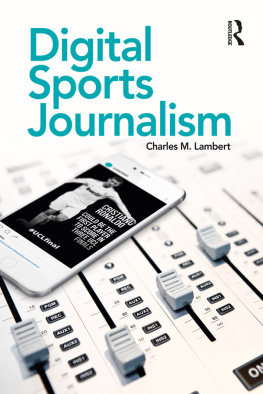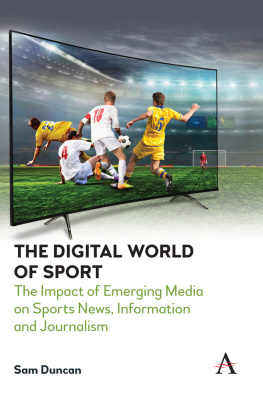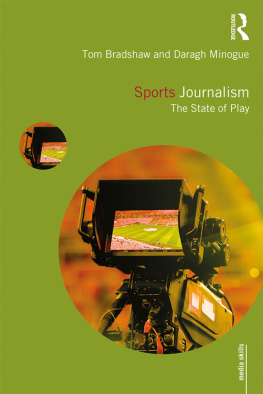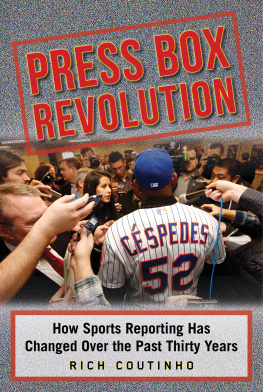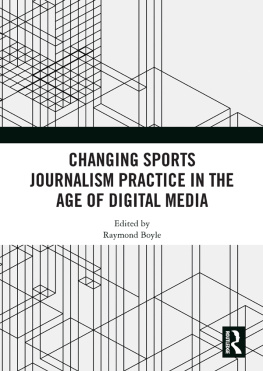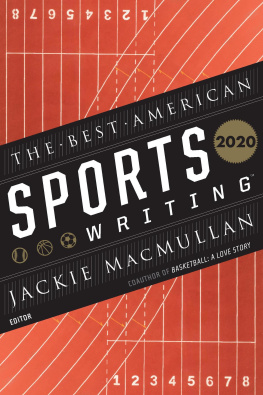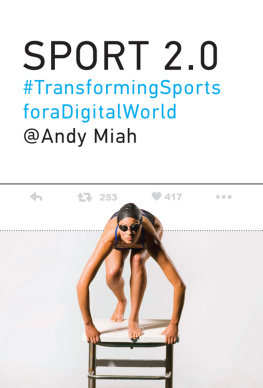Digital Sports Journalism
Digital Sports Journalism gives detailed guidance on a range of digital practices for producing content for smartphones and websites. Each chapter discusses a skill that has become essential for sports journalists today, with student-friendly features throughout to support learning. These include case studies, examples of sports journalism from leading global publications, as well as top tips and practical exercises. The book also presents interviews with leading sport and club journalists with wide-ranging experience at the BBC, Copa90, Wimbledon, the Guardian and BT Sport, who discuss working with new technologies to cover sports stories and events.
Chapters cover:
- live blogging;
- making and disseminating short videos;
- working for a sports club or governing body;
- finding and transmitting stories on social media;
- podcasting;
- longform online journalism.
The job of a sports journalist has altered dramatically over the first two decades of the 21st century, with scope to write content across a new variety of digital platforms and mediums. Digital Sports Journalism will help students of journalism and professionals unlock the potential of these new media technologies.
Charles M. Lambert spent two decades as a television journalist, covering news and sport for the BBC and ITV. He has run the sports journalism degree courses at the University of East London and the University for the Creative Arts, UK, where he is now in charge of the journalism and media cluster.
Digital Sports Journalism
Charles M. Lambert
First published 2019
by Routledge
2 Park Square, Milton Park, Abingdon, Oxon OX14 4RN
and by Routledge
711 Third Avenue, New York, NY 10017
Routledge is an imprint of the Taylor & Francis Group, an informa business
2019 Charles M. Lambert
The right of Charles M. Lambert to be identified as author of this work has been asserted by him in accordance with sections 77 and 78 of the Copyright, Designs and Patents Act 1988.
All rights reserved. No part of this book may be reprinted or reproduced or utilised in any form or by any electronic, mechanical, or other means, now known or hereafter invented, including photocopying and recording, or in any information storage or retrieval system, without permission in writing from the publishers.
Trademark notice: Product or corporate names may be trademarks or registered trademarks, and are used only for identification and explanation without intent to infringe.
British Library Cataloguing-in-Publication Data
A catalogue record for this book is available from the British Library
Library of Congress Cataloging-in-Publication Data
A catalog record for this book has been requested
ISBN: 978-1-138-29620-6 (hbk)
ISBN: 978-1-138-29621-3 (pbk)
ISBN: 978-1-315-10014-2 (ebk)
Typeset in Berling and Futura
by Apex CoVantage, LLC
This book would not have come about but for Niall Kennedy, the former editor of Media and Cultural Studies at Routledge. It was Nialls enthusiasm for my initial idea that persuaded me to explore the idea of a book about smartphone-era sports journalism in more detail and his persuasiveness that convinced me I was the person to write it.
I doubted my qualifications because I am not a digital native but rather someone who learnt his trade working on very traditional BBC and ITV news programmes. But, as I began to explore the digital landscape, I began to realise that there was no one out there with a complete understanding of social media, live blogging, match reporting, video and podcasting making, data-journalism and everything else covered in this book. My job was to find experts and persuade them to share some of the skills of their craft with my readers.
So, I am immensely grateful to everyone who agreed to be interviewed for this book, namely Neil Atkinson, Emily Brammeir, Mark Coyle, Steve Gibbs, Phil Harlow, Paul Hassall, Rebecca James, Nishant Joshi, Jim Mansell, Ben Milne, Andy Naylor, Jean Octavian Popescu, Stewart Power, Ian Singleton, Neil Smythe, Simon Wear, Alexandra Willis and Jonathan Wilson.
I am also indebted to friends, colleagues, former colleagues and former students who helped me track down some of the people on that list, as well as offering their own advice: Lesley Adams, Mark Coyle, Russell Fuller, Adrian Hobart, Barnaby Slater and Robyn Wallis.
The book is also the result of discussions with current and former students. Like most academics, I learn as much from my students as I teach them. It seems invidious to single out just a few individuals but Tom Cann and Alex Dinnadge both worked on projects which have influenced the book; Zoe Burke, Freddie Harding, Elliott Heath and Rebecca James have all given me advice, based on their experiences of working as digital journalists. Alex Lambe has advised on how he built up a Twitter following. Alex Antzara and Tom Cann have allowed me to use their pictures.
My thanks to work colleagues for their support and tolerance during this books gestation, in particular Jacob Crowley, Simon Clarke, Kathryn de Vries, Claire Griffiths, Yuwei Lin, Sophie Miller, Adam Powley, Adrienne Rosen and Nathalie Wiedhase.
Special thanks are due to Kitty Imbert, the editorial assistant at Routledge Media and Cultural Studies, for putting up with all my stupid questions about the publishing process and to Nialls successor Margaret Farrelly.
This is my first attempt at writing a book and I would value any feedback. You can write to me at or via the publisher.
Finally, my biggest debt of thanks goes to my family, Kalpana, Anjali, Rahul and Anya who had to put up with me during the process of writing this book.
Charles M. Lambert, December 2017
Im exponentially happier than I have ever been at my place of work, exponentially. One, its much more exciting because youre on the edge of your seat; youve got to make decisions much more quickly. Two, managing businesses with explosive growth is a lot more enjoyable than managing businesses in decline. (Wear, 2017)
Former magazine publisher Simon Wear, now chief executive of the Play Sports Network, which runs three YouTube channels
Its 1990. You are working as a sports reporter on a regional daily paper in a big northern city. You get a tip-off from a contact at your local, top-flight football club, who says that the manager is interested in signing a player called Paul Johnson from a lower league club in the Midlands.
Who is Paul Johnson? What position does he play? How old is he? Wheres he played before? Your source doesnt know. You reach for your trusty Rothmans Yearbook, the only place to find this kind of information, but Paul Johnson doesnt appear in it. Perhaps hes only joined his current club since the most recent edition was published. Or maybe hes a youth team player who wasnt on the radar when it was being compiled.
You call your opposite number at the paper in the Midlands town. But hes out at the clubs training ground conducting interviews. He has recently been supplied with a mobile phone, someone on the news desk explains exasperatedly, but he keeps it switched off because he hasnt worked out how to use it. So, you call the club itself. It doesnt have a press officer; media enquiries are dealt with by the club secretary and hes out too at a Rotary Club business breakfast. Hell call you when he gets back probably lunchtime.

